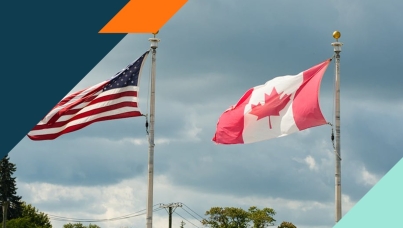Younger Adults Bracing For Increasing Health Costs: 2010 Report Card on Healthcare in Canada
Toronto, ON - While most boomers are closer to the point in their life when they will become more reliant on the healthcare system, the annual 2010 Report Card on Healthcare in Canada, conducted by Ipsos Reid on behalf of the Canadian Medical Association, finds that those under the age of 46 are more likely to be bracing for the increasing costs of healthcare in Canada.
The poll of nearly 3,500 Canadians reveals that those under the age of 46 are more likely than those aged 46 and older to anticipate taking various financial steps in order to prepare themselves for healthcare costs, including: buying long-term health insurance (37% vs. 17%), buying healthcare insurance to supplement public health care coverage during their retirement (44% vs. 26%), dipping into their planned retirement savings to help pay for their own future health costs (27% vs. 18%), altering their retirement plans by working longer travelling less (34% vs. 31%), going into debt (21% vs. 13%) or saving specifically for health costs they will face during their retirement (29% vs. 15).
The Aging Canadian Population...
Understanding that the population of Canada continues to age, Canadians have concerns about how this could impact the future of healthcare service in Canada. Eight in ten (80%) are `concerned' (34% extremely/46% somewhat) that the `quality of healthcare in Canada will decline as a result of increased strain on the healthcare system as the baby boom generation gets older.
Moreover, three quarters (76%) are `concerned' (36% extremely/40 somewhat) about `having to pay more taxes so that the health system can provide services to the baby boom generation', while a similar proportion (79%) is `concerned' (34% extremely/45% somewhat) that `the healthcare system will not be able to offer the same level as coverage as the baby boom generation reaches retirement age'.
The Quality of Healthcare Services...
The fact that so many younger Canadians are taking steps to prepare themselves for future healthcare costs is likely a symptom of a perceived lack of improvement in the system despite rising costs. Just one in three (35%) believe that healthcare services in their community will get `better' (3% much/32% somewhat) over the next two or three years, compared to a majority (51%) who believes those services will get `worse' (14% much/37% somewhat).
According to the 2010 Report Card, Canadians have given the following assessment of the healthcare system when thinking about the services in their community:
- Nearly four in ten (36%) give the overall quality of the healthcare services available to them and their family a grade of "A", unchanged from last year.
- Four in ten (40%) give their most recent experience dealing with the healthcare system in their community an "A", down 2 points from last year.
- One in three (31%) gives the choice of health services in their community an "A", down 1 point.
- One in three (34%) gives the level of cooperation between various health professionals like doctors, pharmacists and nurses in their community a grade of "A", down 1 point.
- Two in ten (17%) give the performance of healthcare providers and their associations in dealing with healthcare in Canada a grade of "A", unchanged from last year.
Access to Healthcare Services...
Similarly, roughly the same proportion of Canadians give an "A" this year as did last year when it comes to accessing various types of services, meaning they believe there has been no measurable improvement since last year when it comes to:
- Access to walk-in clinics: 34% (up 2 points)
- Access to a family doctor: 30% (down 1 point)
- Access to healthcare services for children: 24% (down 1 point)
- Access to emergency room services: 26% (unchanged)
- Access to healthcare services for seniors: 21% (unchanged)
- Access to modern diagnostic equipment such as MRIs and CT scans: 17% (down 1 point)
- Access to healthcare services on evenings and weekends: 18% (down 1 point)
- Access to medical specialists: 18% (down 1 point)
- Access to home health care services: 14% (down 1 point)
- Access to mental healthcare services: 14% (down 2 points)
These are some of the findings of an Ipsos Reid poll conducted between June 8 and 21, 2010, on behalf of the Canadian Medical Association. For this survey, a sample of 3,483 adults from Ipsos' Canadian online panel was interviewed online. Weighting was then employed to balance demographics and ensure that the sample's composition reflects that of the adult population according to Census data and to provide results intended to approximate the sample universe. A survey with an unweighted probability sample of this size and a 100% response rate would have an estimated margin of error of +/-1.7 percentage points, 19 times out of 20, of what the results would have been had the entire population of adults in Canada been polled. All sample surveys and polls may be subject to other sources of error, including, but not limited to coverage error, and measurement error.
For more information on this news release, please contact:
Mike Colledge
President
Ipsos Reid Public Affairs
(613) 688-8971
[email protected]
About Ipsos Reid
Ipsos Reid is Canada's market intelligence leader, the country's leading provider of public opinion research, and research partner for loyalty and forecasting and modelling insights. With operations in eight cities, Ipsos Reid employs more than 600 research professionals and support staff in Canada. The company has the biggest network of telephone call centres in the country, as well as the largest pre-recruited household and online panels. Ipsos Reid's marketing research and public affairs practices offer the premier suite of research vehicles in Canada, all of which provide clients with actionable and relevant information. Staffed with seasoned research consultants with extensive industry-specific backgrounds, Ipsos Reid offers syndicated information or custom solutions across key sectors of the Canadian economy, including consumer packaged goods, financial services, automotive, retail, and technology & telecommunications. Ipsos Reid is an Ipsos company, a leading global survey-based market research group.
To learn more, please visit www.ipsos.ca .
About Ipsos
Ipsos is a leading global survey-based market research company, owned and managed by research professionals. Ipsos helps interpret, simulate, and anticipate the needs and responses of consumers, customers, and citizens around the world.
Member companies assess market potential and interpret market trends. They develop and build brands. They help clients build long-term relationships with their customers. They test advertising and study audience responses to various media. They measure public opinion around the globe. Ipsos member companies offer expertise in advertising, customer loyalty, marketing, media, and public affairs research, as well as forecasting, modeling, and consulting. Ipsos has a full line of custom, syndicated, omnibus, panel, and online research products and services, guided by industry experts and bolstered by advanced analytics and methodologies. The company was founded in 1975 and has been publicly traded since 1999. In 2009, Ipsos generated global revenues of e943.7 million ($1.33 billion U.S.). .
Visit www.ipsos-na.com to learn more about Ipsos offerings and capabilities.
Ipsos, listed on the Eurolist of Euronext - Comp B, is part of SBF 120 and the Mid-100 Index, adheres to the Next Prime segment and is eligible to the Deferred Settlement System. Isin FR0000073298, Reuters ISOS.PA, Bloomberg IPS:FP



